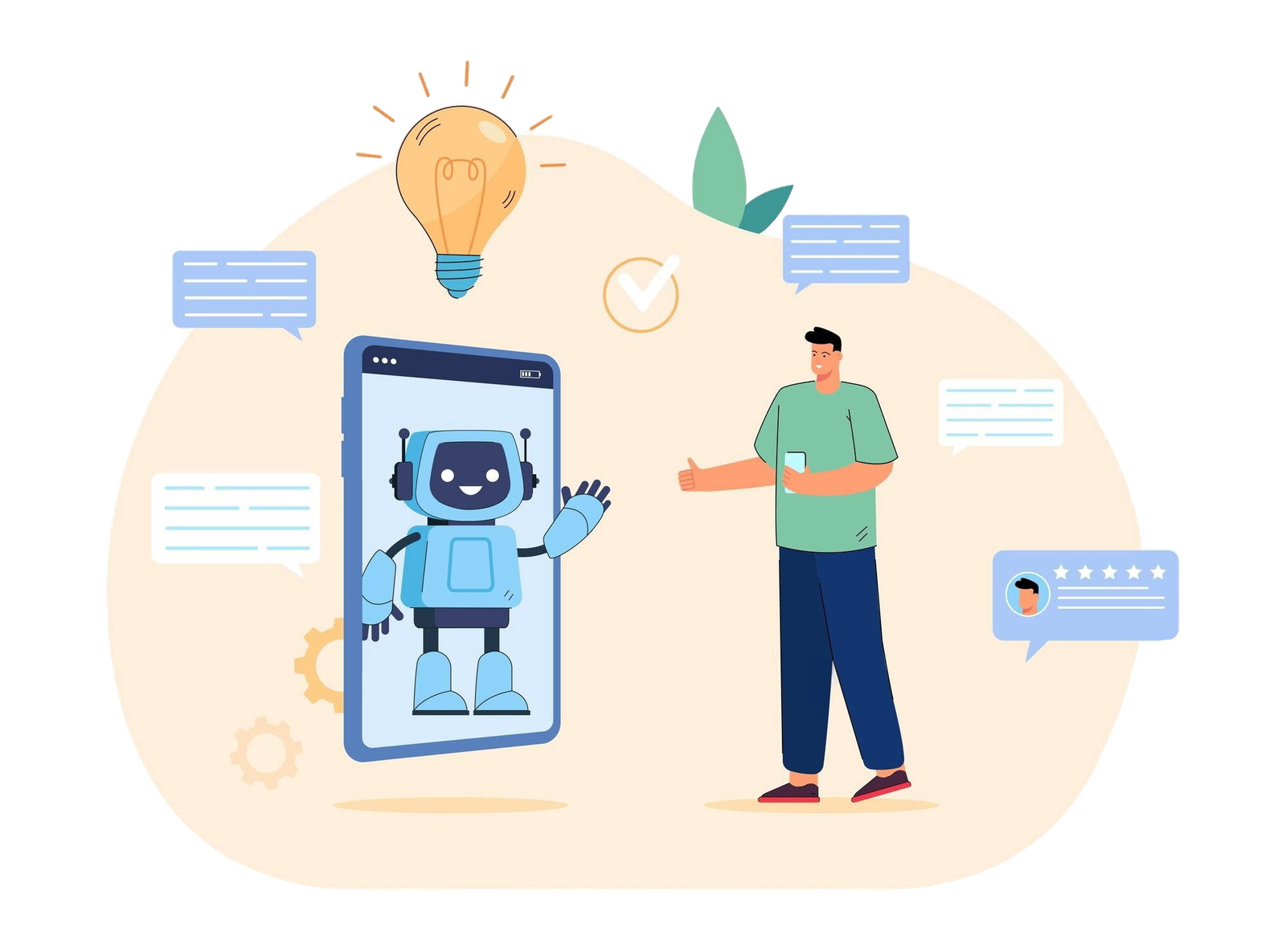
The Future of AI in Business: How to Leverage Artificial Intelligence for Growth, Efficiency, and Innovation in 2025 and Beyond
Artificial Intelligence (AI) is no longer a futuristic concept—it’s a transformative force reshaping the business landscape in 2025. From automating mundane tasks to driving innovation and enabling data-driven decisions, AI is becoming a cornerstone for companies aiming to stay competitive in a rapidly evolving digital world.

Whether you’re a small business owner, a marketing professional, or a corporate leader, understanding how to harness AI can unlock unprecedented opportunities for growth, efficiency, and innovation. But with great potential comes great complexity. How can businesses effectively integrate AI into their operations? What tools and strategies should they adopt, and what challenges lie ahead?
In this comprehensive guide, we’ll explore the future of AI in business, offering actionable insights, real-world examples, and a roadmap for leveraging AI in 2025 and beyond. By the end, you’ll have a clear understanding of how AI can propel your business forward—and how to get started today.
The Current State of AI in Business
AI adoption in business has skyrocketed over the past few years. According to a 2024 McKinsey report, 63% of companies worldwide have implemented AI in at least one business function, up from 20% in 2017. This surge is driven by advancements in machine learning, natural language processing (NLP), and generative AI, which have made AI more accessible and affordable than ever before.
Today, AI is being used across industries to solve a wide range of challenges. Retailers use AI to predict consumer behavior, manufacturers optimize supply chains, and healthcare providers improve patient outcomes through predictive diagnostics. For example, Amazon leverages AI to recommend products with uncanny accuracy, while Tesla uses AI to power its autonomous driving technology.
But it’s not just tech giants reaping the benefits. Small and medium-sized enterprises (SMEs) are increasingly adopting AI to level the playing field. A 2024 Gartner study found that 48% of SMEs plan to invest in AI by the end of 2025, citing improved efficiency and customer satisfaction as key drivers. However, many businesses still struggle with implementation, often due to a lack of expertise, high costs, or concerns about data privacy.
To better understand AI’s capabilities, you might want to explore its foundational technologies. For instance, our article on Understanding ChatGPT: Capabilities, Limitations, and Real-World Applications provides a deep dive into one of the most popular AI tools today, offering insights into how it can be applied in various business contexts.
[get-in-touch title=Understanding ChatGPT: Capabilities subtitle=Limitations and Real-World Applications description=Explore ChatGPT’s capabilities and limitations in this in-depth blog post. Learn how it assists with coding, generates creative ideas, and simplifies learning while understanding its biases and real-world applications. image=chatgpt.png button_secondary_label=Read Article button_secondary_url=https://amilma.digital/blog/understanding-chatgpt-capabilities-limitations-and-real-world-applications][/get-in-touch]
How AI Drives Business Growth
AI is a powerful catalyst for business growth, enabling companies to reach new customers, increase revenue, and optimize their operations. Let’s break down some of the key ways AI can fuel growth in 2025.
AI in Marketing: Personalization and Predictive Analytics
One of the most impactful applications of AI in business is in marketing. AI-powered tools can analyze vast amounts of data to deliver highly personalized customer experiences. For example, AI can segment audiences based on behavior, preferences, and demographics, allowing businesses to create targeted campaigns that resonate with specific customer groups.
Predictive analytics is another game-changer. By analyzing historical data, AI can forecast trends, identify high-value leads, and predict customer churn. This enables marketers to focus their efforts on the most promising opportunities. For instance, Netflix uses AI to recommend shows based on viewing history, which has significantly increased user engagement and retention.
To learn more about how AI is transforming marketing, check out our article on Google AI Overviews: The Next Generation of Search and Its Impact on Your Marketing Strategy, which explores how AI-driven search innovations can enhance your marketing efforts.
AI in Sales: Automating Processes and Predicting Behavior
AI is also revolutionizing sales by automating repetitive tasks and providing actionable insights. Tools like Salesforce Einstein use AI to score leads, predict deal closures, and recommend next steps for sales reps. This allows sales teams to focus on building relationships rather than managing administrative tasks.
Moreover, AI can analyze customer interactions to predict purchasing behavior. For example, an AI system might identify that a customer who frequently browses a specific product category is likely to make a purchase if offered a discount. This level of insight can significantly boost conversion rates.
Case Study: How Company X Increased Revenue with AI
Consider the case of Company X, a mid-sized e-commerce retailer. Facing stagnant growth, they implemented an AI-powered recommendation engine on their website. By analyzing customer browsing and purchase history, the AI system suggested products tailored to each user’s preferences. Within six months, Company X saw a 25% increase in average order value and a 15% boost in overall revenue. This example illustrates how even small businesses can achieve significant growth by leveraging AI.
Boosting Efficiency with AI
Beyond growth, AI is a powerful tool for improving operational efficiency. By automating routine tasks and optimizing workflows, businesses can save time, reduce costs, and improve productivity.
Automating Routine Tasks
AI excels at automating repetitive, time-consuming tasks. For example, in accounting, AI tools like QuickBooks can automatically categorize expenses, reconcile accounts, and generate financial reports. In inventory management, AI systems can predict demand, optimize stock levels, and reduce waste.
AI in Customer Support: Chatbots and 24/7 Service
Customer support is another area where AI shines. AI-powered chatbots, such as those built on platforms like ChatGPT, can handle a wide range of customer inquiries, from answering FAQs to processing returns. These chatbots provide 24/7 support, reducing the need for human agents and improving response times.

For businesses looking to implement AI in customer support, our guide on LocalGPT on Windows: A Guide to Private AI Implementation offers a step-by-step approach to setting up a privacy-focused AI solution that can power your chatbot while keeping customer data secure.
Case Study: How Company Y Reduced Costs with AI
Company Y, a logistics firm, struggled with high operational costs due to inefficient routing and scheduling. They implemented an AI system that analyzed traffic patterns, delivery schedules, and fuel consumption to optimize routes in real-time. As a result, they reduced fuel costs by 20% and improved delivery times by 15%, saving over €100,000 annually. This case highlights how AI can drive efficiency even in traditional industries.
Innovating Through AI
AI isn’t just about optimization—it’s also a driver of innovation. By leveraging AI, businesses can create new products, enhance customer experiences, and stay ahead of market trends.
Developing New Products and Services
Generative AI, a subset of AI that creates new content, is revolutionizing product development. For example, companies in the fashion industry use AI to design clothing based on current trends, while software developers use AI to generate code snippets. Tools like ChatGPT can even assist in brainstorming ideas for new products or marketing campaigns.
Personalizing Customer Experiences
AI enables hyper-personalization, allowing businesses to tailor their offerings to individual customers. For instance, Spotify uses AI to curate personalized playlists, while Starbucks leverages AI to suggest drinks based on past orders. This level of personalization increases customer satisfaction and loyalty.
Predicting Market Trends
AI can analyze market data, social media trends, and consumer behavior to predict future demand. This allows businesses to adapt their strategies proactively. For example, a retailer might use AI to identify an emerging trend for sustainable products and adjust their inventory accordingly.
Case Study: How Company Z Launched an Innovative Product with AI
Company Z, a tech startup, wanted to develop a new app for language learning. They used generative AI to create interactive lessons tailored to each user’s learning style, incorporating real-time feedback and gamification. The app gained 50,000 users within three months of launch, demonstrating how AI can drive innovation and market success.
Practical AI Tools for Business
To help you get started with AI, here’s a roundup of practical tools that can transform your business operations in 2025.
- ChatGPT: Ideal for content creation, customer support, and brainstorming. Learn more about its capabilities in our article Understanding ChatGPT: Capabilities, Limitations, and Real-World Applications.
- LocalGPT: A privacy-focused AI solution for businesses concerned about data security. See our guide on LocalGPT on Windows: A Guide to Private AI Implementation.
- Google AI: Useful for search optimization and marketing insights. Check out Google AI Overviews: The Next Generation of Search and Its Impact on Your Marketing Strategy.
- Jasper: A generative AI tool for creating marketing copy, blog posts, and social media content.
- HubSpot AI

Amilma Digital
Creative Digital Agency from Bosnia and Herzegovina
Leave a comment
Your email address will not be published. Required fields are marked *
